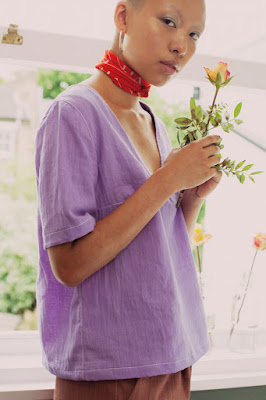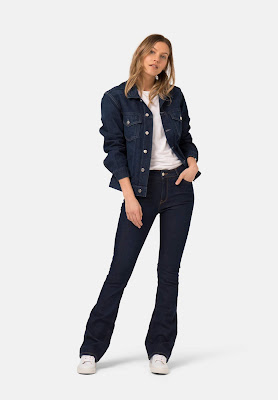Sustainable Brands You Need To Know
When it comes to fashion, what do the words 'sustainability' and 'ethical' conjure up in your mind? Does it mean more than just a Fairtrade sticker?? Are we concerned not only that the material bio-degrades after so many years but also where and by whom it was made and whether their working conditions are up to standards, what chemicals have been used in the manufacturing, what that company does with surplus material?? People are beginning to become aware that we need to have a more caring and responsible attitude towards keeping the environment in a healthy state and fashion is a good place to start.
(picture courtesy of Greenpeace)
I've heard some disturbing facts about the world of fast fashion over the past few weeks and our love and need for everything we see on our social media feeds and the ability (with next day or in some cases, same day, delivery) for instant gratification when it comes to fashion items.
- The fashion industry is the second highest polluter after the oil industry.
- About 25% of the world’s chemicals are used for textile production.
- In 2015 alone, the fashion industry consumed 79 billion cubic metres of water – enough to fill 32 million Olympic-size swimming pools (according to a 2017 report)
- The US spends an estimated $2.6 billion on Halloween costumes every year: worn for one night only.
- 2,700 litres of water is needed to make just one t shirt and around 2000 gallons to make one pair of jeans
- Of the 53m tons of annual clothing production, 73% ends up in landfill or burnt
I thought I really needed THAT particular winter coat that almost broke Instagram a couple of weeks ago. Having seen everyone buying it (which always will put me off) I found one in my local store. I was pretty shocked by the quality of the material (especially as it wasn't that cheap in monetary terms) and I stepped away as I knew this was not a piece that would be in my wardrobe for any length of time. If I find that elusive second hand Max Mara camel coat within my budget that I've been salivating over for years, then I doubt another new coat will ever need pass my threshold again ....... people are less likely to sell very cheap items on resale sites as the garments probably won't have worn well and also they see it as not worth the effort as it was 'only a tenner' and then these items have a higher chance of ending up in land fill. However, there are ways to donate even battered old items to better the world:
Nike Reuse A Shoe - donate any old trainers or athletics shoes and Nike will work with other organisations to reuse them to make amongst other things, sports surfacing
Sal's Shoes - A used shoe distribution charity sending thousands of shoes around the World to help those who would otherwise be barefoot 'helping shoes find new fee' with full transparency
Smalls For All - A Scottish charity which collects and distributes underwear to help women and children in Africa.
I am in no way a saint when it comes to clothes buying. Just last week I bought two jumpers from a 'pile it high, sell 'em cheap' well known store (which shall remain nameless). I did actually love them - the colour, the style, the styling on the billboard - but I'm well aware that these won't wash well and won't stand the test of time. I have now got to the point whereby I've decided I have to LOVE something before I buy it.
Fashion is moving faster than ever and the high street is starting to 'cotton' on (excuse the pun) not only to the public's want for sustainability in whatever form but also our need for transparency (there are over 100 different Eco Standards labels out there). It's a small start in the right direction in many high street cases - what I am aiming to impress within this post is that it's not always the case that ethical and environmentally positive fashion is only at the high end of the market!! I also want to bring your attention to some little known brands and outlets that you may very well never have heard of....... Yes sustainable can be more costly. But think about it. What you're buying are clothes that have been produced after a long thought process, made with love and quality ingredients and built to last. Worth the investment??? I think so. The brands featured below (there were far too many to list all of them) have a sustainable or ethical ethos making smart moves towards the future of fashion. If you think sustainable clothing has no style, think again!!! .......
Thinking Mu - using all sustainable fabrics and with it's own policy they wish you to respect. They have built a strong community working with the same people from India who they started with, who are looked upon as family. One thing stands them out from the rest - they no longer do sales!!!! Thinking MU products are cool - think quirky slogan tees and sweats, utilitarian jumpsuits and comfy pants - without any of the fuss.

Riyka - producing a limited run of each collection, this brand created by a cool East London couple produces a limited run of each collection, source fabrics kind to the environment and produce what they see as timeless (but different and, in my eyes, funky - see below) pieces meant to stand the test of time. With a no waste philosophy, 'studio waste is recycled and fabric waste is up-cycled'.
Ecoalf - a fashion and lifestyle brand 100% committed to making products using only recycled materials. In it's processes so far, it's recyled more than 80 tons of fishing nets this year, uses old coffee grinds to produce yarn, and has recycled 70 million plastic bottles so far.
Birdsong - love this brand!! Their tag line is 'no sweatshops, no photoshop'. Focusing on women in the fashion workplace and work solely with womens' charities and groups to produce their products. All the women who work with Birdsong are offered holistic support. Total transparency as each item is accompanied by details of where it's made/by whom and what fabric is used (often accompanied by a YouTube video). This company has a great ethos and their collective team produce some stunning and often quirky, wares.
Mud Jeans - all for a fairer fashion industry and a move towards the circular economy. Mud have eliminated harmful chemicals in their processing. Well into their recycling, their jeans consist of between 23%-40% post consumer recycled denim. Rather sweetly, they offer an innovative lease system where you can 'hire' a pair of jeans and also offer €10 off a purchase or a months' free lease when recycling your old denim (although your recycled items need to be 96% cotton!!)
Kings of Indigo - 90% of the raw materials used in the production of Kings Of Indigo garments are sustainable. As well as using other sustainable fibres, the only cotton used is either recycled or organic. They detail where their products are made down to the cutting/stitching, laundry and finishing.
They have just recently released their PET puffer jackets - made from 100% recycled plastic bottles and the for the padding they use Primaloft Eco gold – a premium insulation made from recycled PET – an alternative to traditional down feathers. The jacket is fully lined with recycled PET.
Gung Ho - Founded by London designer Sophie Dunster, Gung Ho's products are produced locally and using sustainable fabrics. They have a clever philosophy by making a cause the focus of each collection. Each product comes with a 'minizine' which gives more information on the cause the product centres around. For every item sold, an amount is donated to a charity that works on that particular cause. Great embroidery and illustrative prints makes Gung Ho's products a lot of vibrant fun. Check out their floral oversized ear bling!!!
Mayamiko - unique is the buzz word here. Fabulous prints picked from a fabric market in Malawi and made in a workshop powered by solar. Not what is usually conjured up in your mind when thinking sustainable. This brand is doing so much and has been recognised for it's ethical practices (too many to mention here, but check out their website). Working in partnership with the amazing Mayamiko Trust which, in their own words, 'aims to help the most disadvantaged people in Malawi by nurturing their creative talents and turning them in to sustainable activities that could be transferable to trade practices. Lifting people out of poverty and towards a better future'. Big on ethical trading and sustainable fashion production.
G-Star Raw
G Star make a bold claim with 'Our Most Sustainable Jeans Ever' - reading the blurb on their site proves that this is a company committed to sustainable denim production. Each garment is 98% recyclable and they are continuing until they get to 100%. They desire and aim to be using 100% sustainable cotton by the year 2020. Also 100% transparent as you can check where each product is made, by whom (male/female ratios) and what projects are supported at the factory etc.
Like I said, I couldn't feature all my finds, but there are others (click on links to go straight to sites):
Other sustainable brands
Bug Clothing
I And Me
Finnisterre
Black Velvet Circus
THTC
Antiform
Ninety Percent
Batoko - recycled plastic swimwear
Online Ethical/Sustainable Marketplaces
Lowie
Antibad
Almasanta
The Acey.com
Gather and See
and if you want a more DIY approach to sustainability, why not check out Wool And The Gang and get your 'Knit On' with a knitting or crochet kit...........


































I have read about the fashion industry and the pollution it generates which seems pretty scary. Thank you for sharing. I love the jumpsuit from Hope.
ReplyDeletehttps://www.aproposh.com
Thanks so much for reading and commenting. Great to know what everyone thinks about this but I think we're all singing from the same hymn sheet. Now it's just how best to implement change!!!
Delete